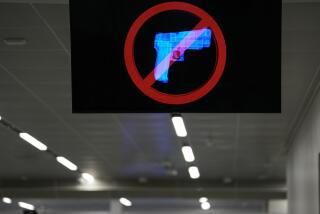Court Says Private Persons Must Prove Falsity in Libel
- Share via
WASHINGTON — The Supreme Court, expanding the constitutional defense against libel actions, ruled Monday that news organizations cannot be required to prove the truth of defamatory statements about private individuals.
The justices held 5 to 4 that when a statement involves an issue of public concern, the First Amendment requires instead that private plaintiffs prove that it is false--meeting a legal burden already required of public figures who bring libel actions.
The court recognized that requiring plaintiffs to carry the burden could insulate some false statements from liability. But placing the burden on media defendants could deter free speech by news organizations fearful of lawsuits, it said.
“Because such a ‘chilling’ effect would be antithetical to the First Amendment’s protection of true speech on matters of public concern, we believe that a private-figure plaintiff must bear the burden,” Justice Sandra Day O’Connor wrote for the majority.
The court’s dissenters assailed the ruling as a “blueprint for character assassination,” saying that it failed to recognize the strong societal interest in protecting private reputations from libelous accusations.
Justice John Paul Stevens, joined by Chief Justice Warren E. Burger and Justices Byron R. White and William H. Rehnquist, declared: “I simply do not understand . . . why a character assassin should be given an absolute license to defame by means of statements that can be neither verified nor disproven.”
The burden of proof can be the pivotal factor in the outcome of a libel case in which the evidence of truth or falsity of a statement is ambiguous or unclear.
In previous rulings, the court has required public officials or public figures seeking libel damages to prove that a statement was false. Such plaintiffs also must show that the statement was published with “actual malice”--that is, either as knowingly false or with reckless disregard for its truth or falsity.
The justices have held that private figures--those who do not seek public attention--need show only that a statement was published with negligence, not malice. But not until now has the court addressed the important question of which side must carry the burden of proof of truth or falsity in cases involving private figures.
Newspaper Upheld
The justices’ ruling upheld contentions by the Philadelphia Inquirer newspaper that the interest in protecting private reputations must yield when necessary to ensure that truthful statements are not punished or suppressed. A wide range of news organizations and civil liberties groups backed the paper, saying that placing the burden on libel defendants could discourage aggressive and truthful reporting on public issues.
The case (Philadelphia Newspapers vs. Hepps, 84-1491) arose when the paper published a series of articles seeking to link Maurice S. Hepps, principal stock owner of a beer and soft drink firm, to organized crime figures.
Verdict Overturned
Hepps brought a libel suit against the paper and, at trial, the judge instructed the jury that Hepps carried the burden of proving the articles false. The jury ruled for the Inquirer, denying Hepps damages. But the Pennsylvania Supreme Court overturned the verdict, holding that under state law it was up to the defendant publisher to show the truth of the statements at issue.
In other action Monday, the court:
--Ruled 6 to 3, in a decision that may discourage attorneys from taking civil rights suits, that federal judges in such cases may approve settlements requiring the prevailing side to waive its right to legal fees from the losers.
A 1976 federal law provides for “reasonable” attorney-fee awards to successful plaintiffs in civil rights actions and courts have held that such fees can be awarded when the case is settled before a trial verdict. But attorneys have complained that they face an ethical dilemma when a defendant, such as a government agency, offers to settle with a plaintiff but only if fee claims are waived.
The court majority, in an opinion by Stevens in an Idaho case, noted that attorneys’ fees sometimes exceed the size of damage awards and that prohibiting a negotiated waiver of fees could deter fair settlements, unnecessarily forcing more cases to trial (Evans vs. Jeff D., 84-1288).
--Agreed, in a case with potentially significant implications for AIDS victims and their employers, to decide in the term beginning next October whether persons with contagious diseases are protected by federal law barring discrimination against the handicapped.
Teacher Fired
The justices will review a Florida case in which a public school teacher was fired after she was diagnosed as having tuberculosis, an infectious respiratory disease. The teacher brought suit, but a trial court upheld school officials. Then, a federal appeals court revived the case, finding that contagious disease was a “handicap” under federal law and that there should be further proceedings to decide whether the teacher was entitled to her old job or another post within the district.
School officials asked for the Supreme Court review, saying that the appellate ruling could result in “disastrous consequences” if applied to all individuals with any form of contagious disease (School Board of Nassau vs. Arline, 85-1277).
--Agreed to rule when, if at all, prosecutors may condition an offer to drop a criminal charge on an agreement by the defendant that he will not sue police or public officials for violation of his civil rights. Such agreements are common within the criminal justice system, but a federal appeals court in Boston said that they are categorically impermissible (Town of Newton, N.H., vs. Rumery, 85-1449).
More to Read
Sign up for Essential California
The most important California stories and recommendations in your inbox every morning.
You may occasionally receive promotional content from the Los Angeles Times.










